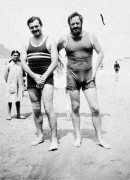
EH-EH: ERNEST HEMINGWAY AND EUSKAL HERRIA
THE HEMINGWAY SOCIETY ANNOUNCES ITS CALL FOR PAPERS FOR THE 20TH INTERNATIONAL HEMINGWAY CONFERENCE TO BE HELD JULY 14-20 2024 IN SAN SEBASTIÁN AND BILBAO, SPAIN.
Participants are invited to get to know the people, places, cuisine, and culture of contemporary Euskal Herria—the Basque Country as it is called in the Basque language. From the colorful depictions of the Navarrese Pyrenees in Hemingway’s first commercial success, The Sun Also Rises, to the characters at the Basque bar in the posthumously published Islands in the Stream, the Basque Country and its people made a lasting mark on Ernest Hemingway’s life and work.
The Hemingway Society invites proposals for papers about any aspect of Hemingway studies, including literary theory and criticism; aesthetics and craft; modernism and modernity; race and ethnicity; class, labor, and work; gender and sexuality; ecocriticism and animal studies; print culture, textual scholarship and book history; material culture and pop culture; travel, tourism, and leisure; influence and intertextuality; disability studies; biography, memoir, and life writing; digital humanities; and other modes of inquiry that add to our understanding of Hemingway.
We are particularly interested in papers about Hemingway and the Basque country, Spain, and related topics, including:
- Hemingway and cosmopolitanism: public spaces and café culture in 1920s Europe; food and drink; geography and place
- Hemingway's journalism: early journalism and Primo de Rivera’s dictatorship; Spanish Civil War writing; Martha Gellhorn, Herbert Matthews, and other journalist contemporaries
- Hemingway and sports: boxing and boxer Paulino Uzcudun, jai alai, fishing, cycling, swimming, tennis, motor racing, and bullfighting
- Hemingway’s contemporaries in the Basque Country: John Dos Passos, Eric Dorman-Smith, Waldo Peirce, Dorothy Rice, Gertrude Stein, Henry Strater, Archibald MacLeish, and Dorothy Parker; as well as Spanish, Basque, and French writers and artists
- Hemingway and humanitarianism, refugees, and exiles: Gustavo Duran, Luis Quintanilla, Basque political exiles and jai-alai players in Cuba
- Hemingway and cinematic representations: the San Sebastián Film Festival; For Whom the Bell Tolls (Sam Wood, 1943)
In addition to individual paper proposals, we also invite panel proposals (of up to 4 presenters and a respondent) or proposals for roundtables (groups of 5-6 participants and a moderator giving shorter papers on a common theme or question); pedagogy papers and roundtables; and multimedia or creative arts presentations.
Please send proposals of about 500 words as well as a brief biographical statement and audio-visual requirements to both Dr. Verna Kale (vlk123@psu.edu) and Dr. Alberto Lena (alena_ord@yahoo.co.uk) by October 31, 2023. If proposing a fully-formed panel or roundtable, please provide a biographical statement and email address for each presenter. If proposing a multimedia or creative arts presentation please provide a sample of the finished work or representative work from your portfolio in addition to your 500-word proposal and bio. Graduate students who wish to be considered for a Hinkle travel grant should indicate their grad student status in their biographical statement, providing the name of their institutional affiliation, degree sought, and expected completion date. Presenters will be notified of acceptance by December 31, 2023.
Independent scholars without institutional affiliation, postdoctoral students, contingent faculty (non-tenure-track), and scholars from economically developing nations are invited to apply for the H.R. Stoneback Award (formerly the Independent Scholars Travel Grants).
Please circulate this CFP widely to colleagues, students, friends, and aficionados who share an interest in Hemingway, Spain, and arts & letters.